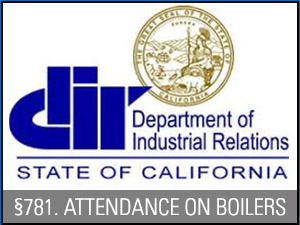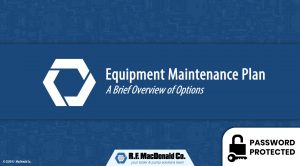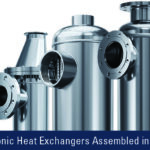
If you operate a boiler in California that requires a permit to operate, the Dept. of Industrial Relations has a Mandatory Attendance rule for boiler operation
If you need training, please see our Training Schedule.
781 – Attendance on Boilers
(a) All boilers subject to these orders shall be under the direct supervision of a responsible person. Such person shall be responsible for:
(1) Safe operation of the boiler by a competent attendant.
(2) Proper maintenance of the boiler and its appurtenances.
(b) While in operation, no fired boiler subject to these orders [except those boilers exempted from annual inspection by Order 771 that are automatically controlled and oil field recovery heaters complying with subsection (d)] shall be left unattended for a period of time longer than it will take the water level to drop from the normal operating level to the lowest permissible water level in the water gage glass–or indicated by indicating devices or recorders–when the feedwater is shut off and the boilers are forced to their maximum capacity unless all of the following are complied with:”
(1) The boiler is equipped with an audible alarm that will operate when the water reaches the highest and lowest permissible operating level, or, for boilers having no fixed steam or water line, when the highest permissible operating temperature is reached.
(2) The audible alarm shall be sufficiently loud that it can be plainly heard by the attendant, without the use of an auxiliary paging system, at any point in any area that the attendant is required to work. He must be close enough to the boiler room so that he can safely respond to the alarm. The response time is that period of time that it takes the water level to go from the level at which the low level alarm sounds down to the lowest permissible water level of the boiler. The high water level alarm must be set so that the attendant will have time to respond before there will be carryover from the boiler.
(3) The boiler is equipped with a low water safety device that will shut off the fuel to the burner or burners when the water reaches the lowest permissible operating level, or, for boilers having no fixed steam or water line, when the highest permissible operating temperature is reached. This device shall require manual resetting unless the pilot is equipped with a full safety pilot control.
(4) The attendant shall personally check the operation of the boiler, the necessary auxiliaries and the water level in the boiler at such intervals as are necessary to insure the safe operation of the boiler; provided, however, that the maximum interval the boiler and its auxiliaries can be left without checking shall not exceed 60 minutes. The operation of the automatic controls shall be checked at the beginning of each shift. It is the intent of this Section to prohibit the use of time clocks to control the operation of fired boilers covered under this subsection 781(b).
(5) All float chambers of automatic controls shall be dismantled for inspection at the annual boiler inspection.
(c) The competent attendant shall be a person who is familiar with the boiler and who has been properly instructed in its safe operation.
The recommended minimum standards to be used by the employer to determine the competency of an attendant are:
(1) He shall be able to explain the function and operation of all controls on the boiler or boilers.
(2) He shall be able to light off the boiler or boilers in a safe manner.
(3) He shall know all possible methods of feeding water to the boiler or boilers.
(4) He shall know how to blow down the boiler or boilers in a safe manner.
(5) He shall know what would happen if the water was permitted to drop below the lowest permissible operating level.
(6) He shall know what would happen if the water in the boiler was carried too high.
(7) He shall know how to shut down the boiler or boilers.
771. Boilers Not Subject to Annual Inspection
All Boilers are subject to these orders unless exempted by one of the following:
(a) The following boilers are not subject to annual inspection and do not require a permit to operate providing they comply with all of the provisions of subsection (b):
(1) Low-pressure boilers.
(2) Miniature boilers.
(3) High-temperature water boilers.
(4) Boilers, including forced circulation boilers, in which none of the following are exceeded:
(A) One hundred square feet (100 sq. ft.) of heating surface.
(B) Steam drum does not exceed 16 inches inside diameter.
(C) Maximum allowable working pressure does not exceed 100 psi.
(D) Water capacity does not exceed 35 gallons when filled to normal operating level.
(E) The BTU input to the burners does not exceed 400,000 BTU/hr.
(b) Boilers exempt from annual inspection in subsection (a) shall comply with all of the following:
(1) All other provisions of these Orders including construction and installation.
(2) Automatically controlled fired boilers shall be fitted with all the applicable controls required for low-pressure boilers in 763(d).
(3) All automatic controls shall be maintained in operating condition.
(c) Nothing in sections (a) and (b) above shall prohibit any qualified safety engineer employed by the Division from requiring any boiler to be prepared for inspection when in his opinion such inspection is necessary to determine the safety of the boiler.
To see the entire list of California Boiler Safety Orders, visit dir.ca.gov/Title8/sub2.html
State of California Pressure Vessel Headquarters Office
Manager: Don Cook, Principal Engineer
1515 Clay Street, Suite 1622-A
Oakland, CA 94612
P: (510) 622-3052
F: (510) 622-3063





